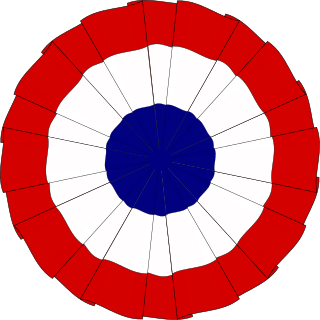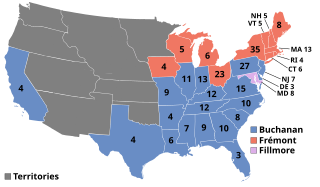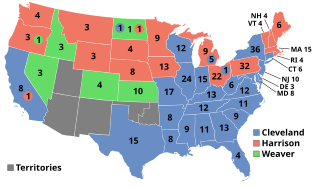
The Republican Party, also known as the GOP, is one of the two major contemporary political parties in the United States. It emerged as the main political rival of the then-dominant Democratic Party in the mid-1850s, and the two parties have dominated American politics since then.

The 1996 United States presidential election was the 53rd quadrennial presidential election, held on Tuesday, November 5, 1996. Incumbent Democratic President Bill Clinton and his running mate, incumbent Democratic Vice President Al Gore were re-elected to a second and final term, defeating the Republican ticket of former Senate Majority Leader Bob Dole and former Secretary of Housing and Urban Development Jack Kemp and the Reform ticket of businessman Ross Perot and economist Pat Choate.

The Republican Party, known retroactively as the Democratic-Republican Party, was an American political party founded by Thomas Jefferson and James Madison in the early 1790s. It championed liberalism, republicanism, individual liberty, equal rights, decentralization, free markets, free trade, and agrarianism. In foreign policy it was hostile to Great Britain and in sympathy with the French Revolution. The party became increasingly dominant after the 1800 elections as the opposing Federalist Party collapsed.

The 1876 United States presidential election was the 23rd quadrennial presidential election, held on Tuesday, November 7, 1876.

The 1856 United States presidential election was the 18th quadrennial presidential election, held on Tuesday, November 4, 1856. In a threeway election, Democrat James Buchanan defeated Republican nominee John C. Frémont and Know Nothing/Whig nominee Millard Fillmore. The main issue was the expansion of slavery as facilitated by the Kansas–Nebraska Act of 1854. Buchanan defeated President Franklin Pierce at the 1856 Democratic National Convention for the nomination. Pierce had become widely unpopular in the North because of his support for the pro-slavery faction in the ongoing civil war in territorial Kansas, and Buchanan, a former Secretary of State, had avoided the divisive debates over the Kansas–Nebraska Act by being in Europe as the Ambassador to the United Kingdom.

The 1872 United States presidential election was the 22nd quadrennial presidential election, held on Tuesday, November 5, 1872. Despite a split in the Republican Party, incumbent President Ulysses S. Grant defeated Democratic-endorsed Liberal Republican nominee Horace Greeley.

The 1884 United States presidential election was the 25th quadrennial presidential election, held on Tuesday, November 4, 1884. In the election, Governor Grover Cleveland of New York narrowly defeated Republican James G. Blaine of Maine. It was set apart by mudslinging and personal allegations that eclipsed substantive issues, such as civil administration change. Cleveland was the first Democrat elected president of the United States since James Buchanan in 1856, the first to hold office since Andrew Johnson left the White House in 1869, and the last to hold office until Woodrow Wilson, who began his first term in 1913. For this reason, 1884 is a significant election in U.S. political history, marking an interruption in the era when Republicans largely controlled the presidency between Reconstruction and the Great Depression.

The 1892 United States presidential election was the 27th quadrennial presidential election, held on Tuesday, November 8, 1892. In the fourth rematch in American history, the Democratic nominee, former president Grover Cleveland, defeated the Republican incumbent, President Benjamin Harrison. Cleveland's victory made him the first president in American history to be elected to a non-consecutive second term, a feat that would not be repeated until Donald Trump was elected in 2024. It was also the first of two occasions that incumbents were defeated in consecutive elections—the second being Gerald Ford's loss to Jimmy Carter in 1976, followed by Carter's loss to Ronald Reagan in 1980. To date, it is the only election in which both major party nominees had served as president.

The 1916 United States presidential election was the 33rd quadrennial presidential election, held on Tuesday, November 7, 1916. Incumbent Democratic President Woodrow Wilson narrowly defeated former associate justice of the Supreme Court Charles Evans Hughes, the Republican candidate.

The 1928 United States presidential election was the 36th quadrennial presidential election, held on Tuesday, November 6, 1928. Republican former Secretary of Commerce Herbert Hoover defeated the Democratic nominee, Governor Al Smith of New York. After President Calvin Coolidge declined to seek reelection, Hoover emerged as his party's frontrunner. As Hoover's party opponents failed to unite around a candidate, Hoover received a large majority of the vote at the 1928 Republican National Convention. The strong state of the economy discouraged some Democrats from running, and Smith was nominated on the first ballot of the 1928 Democratic National Convention. Hoover and Smith had been widely known as potential presidential candidates long before the 1928 campaign, and both were generally regarded as outstanding leaders. Both were newcomers to the presidential race and presented in their person and record an appeal of unknown potency to the electorate. Both faced serious discontent within their respective parties' membership, and both lacked the wholehearted support of their parties' organization.

The 1948 United States presidential election was the 41st quadrennial presidential election. It was held on Tuesday, November 2, 1948. In one of the greatest election upsets in American history, incumbent Democratic President Harry S. Truman defeated heavily favored Republican New York Governor Thomas E. Dewey, and third-party candidates, becoming the third president to succeed to the presidency upon his predecessor's death and be elected to a full term.
Social conservatism is a political philosophy and a variety of conservatism which places emphasis on traditional social structures over social pluralism. Social conservatives organize in favor of duty, traditional values and social institutions, such as traditional family structures, gender roles, sexual relations, national patriotism, and religious traditions. Social conservatism is usually skeptical of social change, instead tending to support the status quo concerning social issues.

The Social Democratic Party is the largest political party in Romania. It is also the largest social democratic political party in the country. It was founded by Ion Iliescu, Romania's first democratically elected president at the 1990 Romanian general election. It is currently part of the National Coalition for Romania (CNR), which is a big tent grand coalition comprising also the National Liberal Party (PNL). The CNR formerly included the Democratic Alliance of Hungarians in Romania (UDMR/RMDSZ) until mid June 2023.
Liberalism and radicalism are important political movements in Romania. Many political parties from these traditions have had important historical roles and substantial support, including representation in the Parliament of Romania. Not all Romanian political parties relevant to this tradition have explicitly described themselves as liberal or radical.

Our Party, previously known as the Republican People's Party, is a left-wing and populist political party in Moldova. Founded in 1999 as the Peasants' Christian Democratic Party of Moldova, it promotes advocacy for Russians in Moldova, social conservatism, and soft Euroscepticism. Its party chairman is Renato Usatîi, while other key figures include Dumitru Ciubașenco and Ilian Cașu.

The Romanian National Unity Party was a nationalist political party in Romania between 1990 and 2006.

The Ploughmen's Front was a Romanian left-wing agrarian-inspired political organisation of ploughmen, founded at Deva in 1933 and led by Petru Groza. At its peak in 1946, the Front had over 1 million members.

Liberal Party is a conservative-liberal political party in Moldova. The president of the party is the former Mayor of Chișinău, Dorin Chirtoacă.

The Party of Socialists of the Republic of Moldova is a democratic socialist political party in Moldova. A populist party, it holds Eurosceptic and Russophilic views, both of which are reflected by its long-time leader and former Moldovan president Igor Dodon. It is contrasted to like-minded centre-left European parties for its conservative views on social issues, reflecting the country's strong social conservatism and the influence of the Moldovan Orthodox Church.
The Republican Party of Moldova is a political party in Moldova.

















